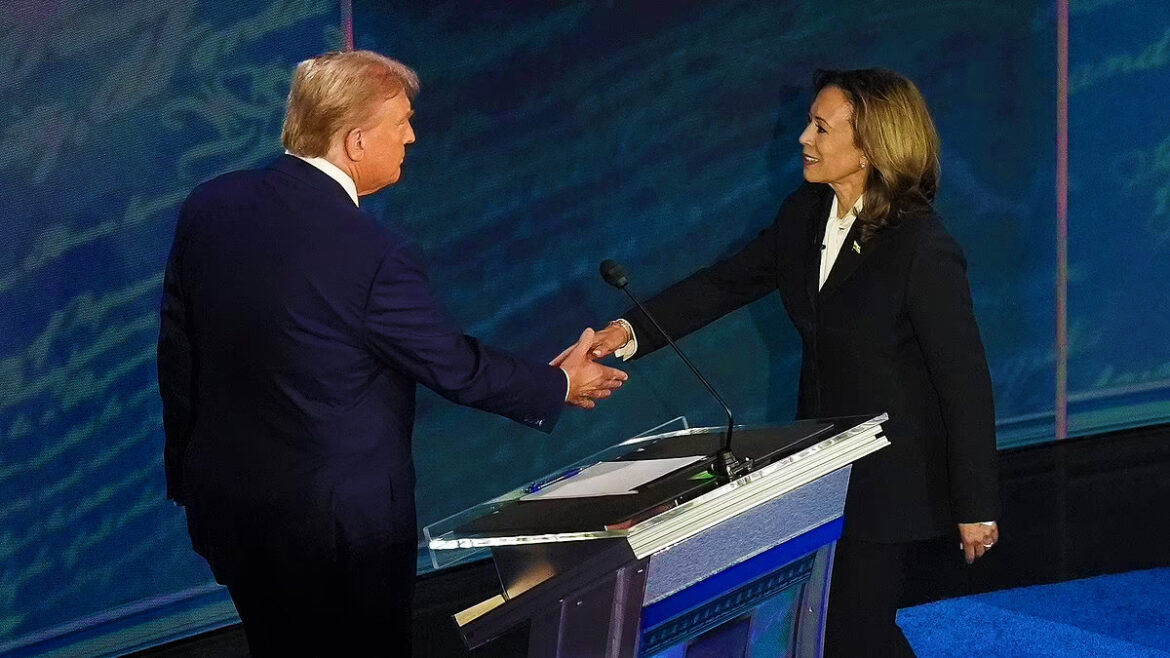The September 10, 2024, debate between former President Donald Trump and Vice President Kamala Harris was a contentious and charged exchange, featuring intense disagreements and conflicting viewpoints from both sides.
Topics covered included immigration, economic policies, foreign relations, abortion rights, and the events of January 6th, each bringing its own set of disputes and assertions.
Immigration
A highly controversial moment arose when Trump made the false claim that immigrants were allegedly involved in stealing and eating pets in Springfield, Ohio—an assertion rooted in social media rumors and debunked by local authorities. He also repeated his unsupported assertion that “millions of people” were entering the U.S. from prisons and mental institutions, supposedly taking jobs from African Americans and Hispanics. Research consistently shows that immigrants, including undocumented ones, are statistically less likely to commit crimes than native-born citizens.
Economic Policies and Tariffs
The debate on economic issues saw Harris and Trump clashing over Trump’s proposed “universal baseline tariffs.” Harris cited estimates suggesting that these tariffs would increase costs by $4,000 annually for the average American family, according to a liberal think tank. Trump countered with the incorrect claim that tariffs would not impact American consumers, asserting that foreign countries would absorb the costs. Economists generally agree that while the exact figures may vary, tariffs typically raise consumer costs.
Russia and Ukraine
In a heated exchange about foreign policy, Trump falsely claimed that Harris had been tasked with negotiating peace between Russia and Ukraine in 2022. In truth, Harris met with Ukrainian President Volodymyr Zelenskyy, not Russian President Vladimir Putin, contrary to Trump’s suggestion.
Abortion Rights
Abortion rights became another major point of contention. Trump continued to assert that Democrats support late-term abortions and even abortions after birth—claims that are illegal and unsupported by evidence. Harris accused Trump of planning to sign a national abortion ban, a claim Trump denied during the debate. Both candidates fell back on familiar talking points: Harris emphasized women’s rights, while Trump appealed to his conservative base.
Employment and Trade
The candidates engaged in a back-and-forth over employment and trade deficits, with each accusing the other of poor job performance. Harris highlighted that Trump’s economic policies led to one of the highest trade deficits in U.S. history. Trump argued that his administration had achieved the “greatest economy” before the pandemic. Both candidates made exaggerated claims, with Harris stretching her arguments and Trump failing to fully address the complexities of economic data.
Election Fraud and January 6th
Trump reiterated his false claims that the 2020 election was stolen from him, despite numerous legal challenges being dismissed or rejected. He also downplayed his role in the events of January 6th, 2021, even as Harris pointed to his involvement and ongoing investigations.
Takeaways
1. Debate Dynamics: The debate was notably one-sided, with Harris demonstrating a strong performance and effectively challenging Trump. She addressed her policy shifts, engaged aggressively, and drew attention to Trump’s record, often putting him on the defensive. Her commanding presence and focus on future-oriented policies contrasted sharply with Trump’s often disjointed and defensive responses.
2. Trump’s Policy Confusion: Trump’s debate performance highlighted his lack of coherent policy proposals and frequent reliance on falsehoods. His tendency to veer into conspiracies and inaccurate claims about immigration and other issues became even more pronounced against Harris’s well-articulated positions.
3. Trump’s Evasiveness: Throughout the debate, Trump struggled to provide direct answers on key issues such as Ukraine, January 6th, and a potential national abortion ban. His evasiveness and reliance on repeated falsehoods underscored his defensive posture.
4. Increased Fact-Checking: Unlike previous debates, the moderators for this event actively fact-checked statements, particularly those made by Trump. This approach helped clarify several contentious and misleading claims, ensuring a more informed discussion.
5. Harris’s Strong Performance: Harris’s debate performance was widely praised, showcasing her ability to handle Trump effectively and address various issues with clarity. Despite her strong showing, the political landscape remains unpredictable, and her performance alone may not guarantee electoral success.
Overall, the debate underscored deep divisions and highlighted the critical role of fact-checking in navigating complex political discussions.
Source: FactCheck.org


